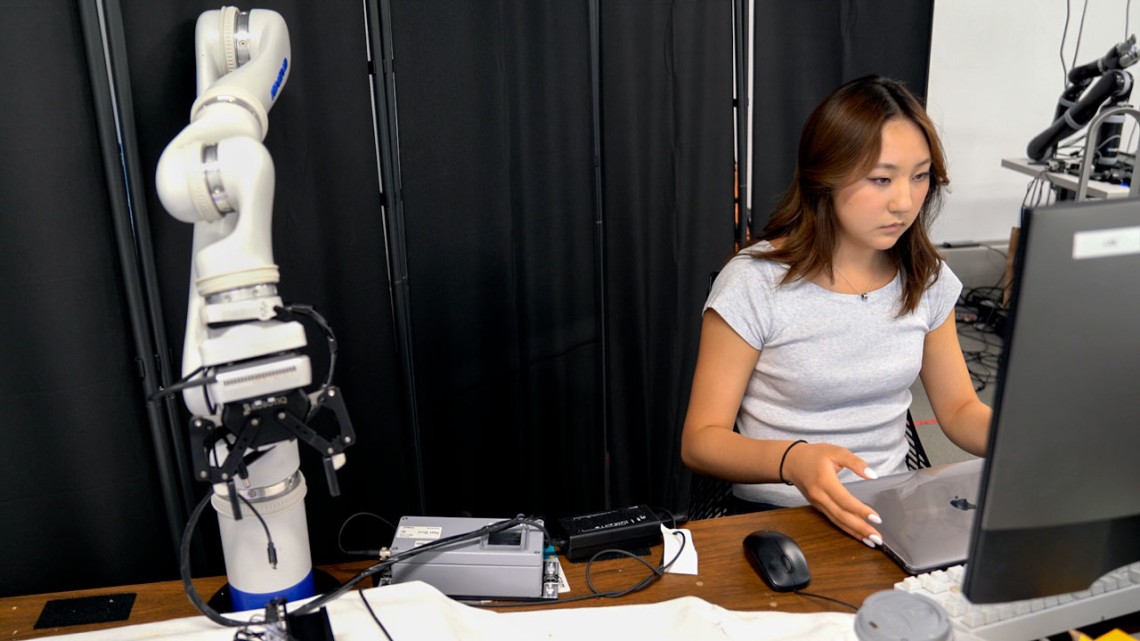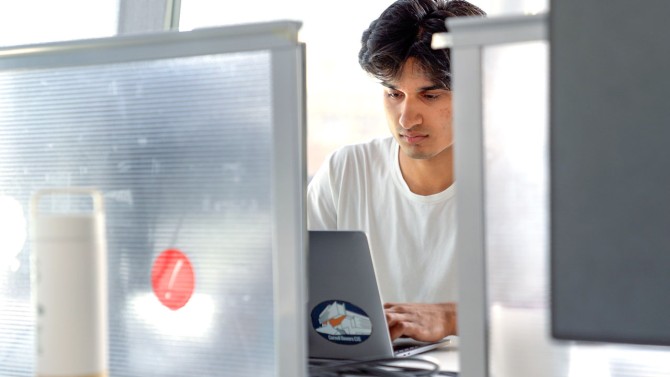
During this summer’s Bowers Undergraduate Research Experience, Joyce Yang ’27, a computer science major, worked with Cornell’s EmPRISE Lab to develop a robotic system to transfer a patient from a bed to a wheelchair.
Summer program gives undergraduates a taste of research life
By Louis DiPietro
Research takes time.
“On top of classes and extracurricular commitments, I often struggle to find enough time for research during the semester,” said James Kim ’25, a computer science and math major.
But this summer, thanks to the Bowers Undergraduate Research Experience (BURE), Kim, along with 60 of his undergraduate peers from the Cornell Ann S. Bowers College of Computing and Information Science, can give research the time it requires. In the process, Kim is discovering a career path. Working alongside Amy Kuceyeski, adjunct associate professor of statistics and data science and professor of mathematics in radiology and of mathematics in neuroscience in the Feil Family Brain and Mind Research Institute at Weill Cornell Medicine, Kim uses machine learning models to analyze brain scans and predict the onset of various neurological disorders. He plans to pursue a doctoral degree in computer science, with a focus on artificial intelligence, neuroscience and health care.
“What I was able to get done over two months during the semester, I got done in maybe a week or two here during the summer,” Kim said. “BURE has been extremely worthwhile. The mentorship and the support have been priceless.”
Hosted by the Cornell Bowers CIS and encompassing Cornell’s Ithaca campus and Cornell Tech in New York City, BURE is a 10-week summer program where Cornell undergraduates are paired with one of nearly 40 faculty mentors and their doctoral students to tackle a specific research project. BURE students work full time for an hourly wage or a research stipend. Open to all Cornell Bowers CIS undergraduates, the program is meant to give undergraduate students a preview of the open, free-form nature of research so that they can decide whether pursuing a doctoral degree is the right choice, said Adrian Sampson, associate professor of computer science and a BURE mentor.
“If students are at all considering a career in research, it does not make sense to immediately apply to a Ph.D. program without doing any,” said Sampson, who is mentoring six undergraduate students in his Computer Architecture and Programming Abstractions (CAPRA) lab this summer. “By the end of the summer, I hope students get a sense of whether this is something they want to do long term. Maybe they like research, or they don’t. There’s no shame in either direction.”
BURE student Joyce Yang ’27 is working with the EmPRISE Lab, directed by Tapomayukh Bhattacharjee, assistant professor of computer science, to develop a robotic system that can safely transfer a care recipient from a bed to a wheelchair. While there has been limited research on this topic, human transferring is one of caregivers’ most challenging daily tasks, making her work all the more meaningful, Yang said.
“With research, I think it’s fun that you never really know when you’re going to be done with a project, and that it can go as far as you’d like it to go,” said Yang, a computer science major. “There’s a possibility of discovering or inventing something that’s novel, and, especially with robotics, something that could truly have a positive impact in people’s lives.”
Along with research opportunities, BURE offers a series of weekly talks from mentors about life as a researcher, and regular social events throughout the summer. At BURE’s conclusion, participating students showcase their work during a research symposium.
BURE has given Kabir Samsi ’26 the time and experience to decide what he’d like to do after his undergraduate studies, he said.
“The experience has been fantastic,” said Samsi, a computer science major and music minor who is working in Sampson’s CAPRA Lab on a project related to packet scheduling, a model for improving the way computer systems handle flows of data. “I think it's hugely inspired me to want to continue a path of research.”
New this summer is BURE Next, run by the Cornell Bowers CIS’s Office of Diversity, Equity, Inclusion, and Belonging. It was created to encourage research opportunities for undergraduate students from underrepresented groups everywhere – not just at Cornell; anyone can apply. Four students are participating in BURE Next this summer.
BURE is offered every summer, and Cornell Bowers CIS students can apply via the college’s website.
Louis DiPietro is a writer for the Cornell Ann S. Bowers College of Computing and Information Science.
Media Contact
Get Cornell news delivered right to your inbox.
Subscribe

